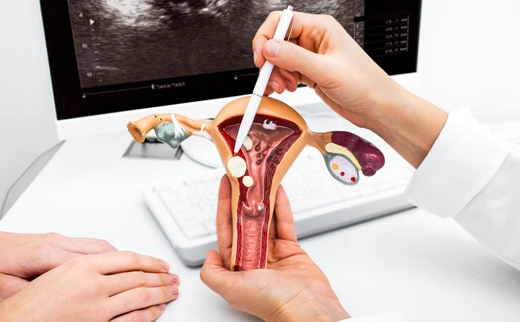
Infertility affects millions of couples worldwide and is often the result of subtle, treatable conditions within the reproductive system. With the rise of assisted reproductive technologies like in vitro fertilization (IVF) more couples are achieving pregnancy, but success depends heavily on a healthy uterine environment.
One commonly overlooked factor that may impair fertility is the presence of endometrial polyps. While many polyps are harmless and does not cause any symptom, they might significantly affect fertility, especially in women trying to conceive naturally or through assisted reproductive techniques such as IVF.
Polyps are benign growths in the lining of the uterus (endometrium) and, although often asymptomatic, they can interfere with embryo implantation. Endometrial polyps may be sessile (broad-based) or pedunculated (attached by a stalk),and vary in size from a few millimeters to several centimeters—sometimes silently reducing the chances of conception.
Endometrial polyps are most commonly seen in women between the ages of 30 and 50, especially in those experiencing hormonal imbalances or undergoing evaluation for infertility. These benign growths are found in approximately 10 to 24% of women in the general population, but the rates are significantly higher among those with fertility concerns. In fact, studies have shown that up to 32% of women with unexplained infertility may have undiagnosed polyps. Because they often do not cause symptoms, endometrial polyps are frequently discovered incidentally during routine fertility assessments or in preparation for treatments such as in vitro fertilization (IVF).
Although many women with endometrial polyps do not experience any symptoms, there are several signs that may indicate their presence. These include irregular menstrual bleeding, spotting between periods, and bleeding after menstruation or sexual intercourse. In some cases, endometrial polyps may also be associated with recurrent miscarriages or difficulty getting pregnant, especially when no other cause of infertility is found. If you are trying to conceive and notice any of these symptoms, it is important to undergo a thorough uterine evaluation to rule out or confirm the presence of polyps.
Yes, in some cases, endometrial polyps can directly interfere with a woman’s ability to become pregnant.
One way they may impact fertility is by creating a mechanical obstruction—physically blocking the embryo from implanting in the uterus or disrupting the passage of sperm.
In addition, polyps can trigger chronic inflammation within the uterine lining, making it less receptive to an embryo.
They may also alter the balance of hormone receptors, affecting how the endometrium responds to essential hormones like estrogen and progesterone. Research has shown that polyps can reduce the expression of important implantation-related genes, such as HOXA10, LIF, and integrins, which play a crucial role in preparing the uterus for pregnancy.
In some cases, particularly when polyps are large or numerous, they may distort the shape of the uterine cavity, further hindering embryo development and early placental formation.
All of these factors can make it more difficult for a pregnancy to occur or be sustained.
Diagnosing endometrial polyps accurately often requires a combination of imaging techniques and, in some cases, direct visualization of the uterine cavity. One of the most commonly used methods is transvaginal ultrasound (TVUS),which can detect abnormal thickening or localized lesions within the endometrial lining.
For a more detailed view, a saline infusion sonohysterography (SIS) may be performed, where sterile fluid is gently introduced into the uterus to enhance imaging and highlight any abnormalities.
The most definitive method is hysteroscopy, considered the gold standard, where a thin, lighted camera is inserted through the cervix into the uterus, allowing the doctor to see and remove polyps directly during the same procedure.
In certain cases, especially when there is abnormal bleeding or concern about cancer, an endometrial biopsy may also be performed to analyze tissue samples under a microscope.
Yes! Removing endometrial polyps can greatly improve your chances of becoming pregnant.
The preferred treatment is called hysteroscopic polypectomy, a simple and minimally invasive procedure usually done on an outpatient basis with mild anesthesia. This means no cuts or large incisions are needed. During the procedure, the polyps are carefully removed and sent for examination. Many women experience improved chances of natural pregnancy after polyp removal, and it can also increase the success rates of fertility treatments like IVF. In fact, studies show that up to 78% of women conceive naturally within a year after having their polyps removed.
Polyp removal is usually recommended if you are planning to start fertility treatments like IVF or IUI. It is also advised for women who have experienced multiple failed embryo implantations or repeated miscarriages. If the polyps cause symptoms such as abnormal bleeding or if they are larger than 1.5 centimeters, removal is generally recommended to improve your chances of a healthy pregnancy.
Conclusion
As a specialist in gynecology and IVF treatment in Istanbul, I highly recommend a thorough uterine cavity evaluation for all women experiencing infertility. Although often silent, endometrial polyps can be a reversible cause of infertility that affects your ability to conceive naturally or with assisted reproductive technologies. Removing these polyps through a minimally invasive and safe hysteroscopic polypectomy procedure can significantly increase your pregnancy success rates. Early diagnosis and treatment of uterine abnormalities like polyps are essential steps toward achieving a healthy pregnancy.
Fertility Evaluation and Polypectomy in İstanbul
At ivftreatmentistanbul.com we offer: